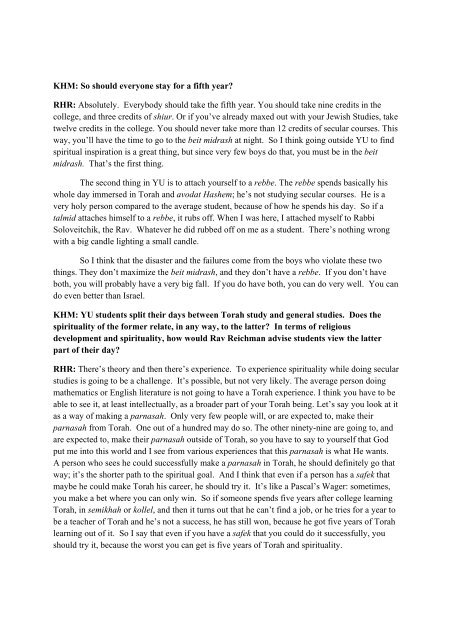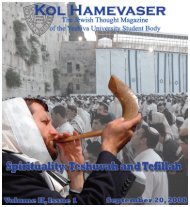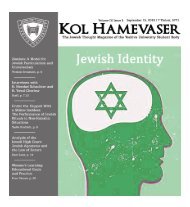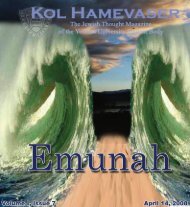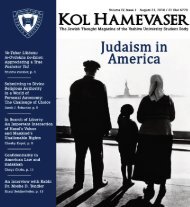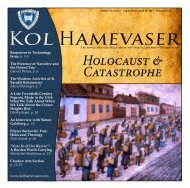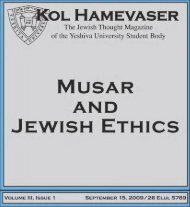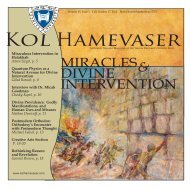here - Kol Hamevaser
here - Kol Hamevaser
here - Kol Hamevaser
You also want an ePaper? Increase the reach of your titles
YUMPU automatically turns print PDFs into web optimized ePapers that Google loves.
KHM: So should everyone stay for a fifth year<br />
RHR: Absolutely. Everybody should take the fifth year. You should take nine credits in the<br />
college, and three credits of shiur. Or if you’ve already maxed out with your Jewish Studies, take<br />
twelve credits in the college. You should never take more than 12 credits of secular courses. This<br />
way, you’ll have the time to go to the beit midrash at night. So I think going outside YU to find<br />
spiritual inspiration is a great thing, but since very few boys do that, you must be in the beit<br />
midrash. That’s the first thing.<br />
The second thing in YU is to attach yourself to a rebbe. The rebbe spends basically his<br />
whole day immersed in Torah and avodat Hashem; he’s not studying secular courses. He is a<br />
very holy person compared to the average student, because of how he spends his day. So if a<br />
talmid attaches himself to a rebbe, it rubs off. When I was <strong>here</strong>, I attached myself to Rabbi<br />
Soloveitchik, the Rav. Whatever he did rubbed off on me as a student. T<strong>here</strong>’s nothing wrong<br />
with a big candle lighting a small candle.<br />
So I think that the disaster and the failures come from the boys who violate these two<br />
things. They don’t maximize the beit midrash, and they don’t have a rebbe. If you don’t have<br />
both, you will probably have a very big fall. If you do have both, you can do very well. You can<br />
do even better than Israel.<br />
KHM: YU students split their days between Torah study and general studies. Does the<br />
spirituality of the former relate, in any way, to the latter In terms of religious<br />
development and spirituality, how would Rav Reichman advise students view the latter<br />
part of their day<br />
RHR: T<strong>here</strong>’s theory and then t<strong>here</strong>’s experience. To experience spirituality while doing secular<br />
studies is going to be a challenge. It’s possible, but not very likely. The average person doing<br />
mathematics or English literature is not going to have a Torah experience. I think you have to be<br />
able to see it, at least intellectually, as a broader part of your Torah being. Let’s say you look at it<br />
as a way of making a parnasah. Only very few people will, or are expected to, make their<br />
parnasah from Torah. One out of a hundred may do so. The other ninety-nine are going to, and<br />
are expected to, make their parnasah outside of Torah, so you have to say to yourself that God<br />
put me into this world and I see from various experiences that this parnasah is what He wants.<br />
A person who sees he could successfully make a parnasah in Torah, he should definitely go that<br />
way; it’s the shorter path to the spiritual goal. And I think that even if a person has a safek that<br />
maybe he could make Torah his career, he should try it. It’s like a Pascal’s Wager: sometimes,<br />
you make a bet w<strong>here</strong> you can only win. So if someone spends five years after college learning<br />
Torah, in semikhah or kollel, and then it turns out that he can’t find a job, or he tries for a year to<br />
be a teacher of Torah and he’s not a success, he has still won, because he got five years of Torah<br />
learning out of it. So I say that even if you have a safek that you could do it successfully, you<br />
should try it, because the worst you can get is five years of Torah and spirituality.


